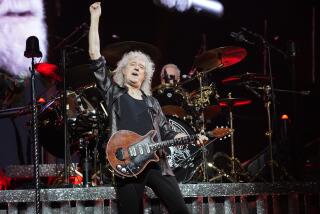JAZZ REVIEW : McCann’s Return Outing Is Anything But Typical
- Share via
NEWPORT BEACH — If he hadn’t alerted the crowd and hadn’t regularly kept his right hand in his lap in the middle of tunes, Les McCann’s upbeat, spirit-filled concert Friday at the Hyatt Newporter might have seemed like a typical gig for the pianist-singer.
But this show was anything but de rigueur: It was McCann’s first performance with his Magic band since suffering a January stroke in Zelle, Germany, which left portions of his right side paralyzed.
Given the circumstances, McCann had reason to be nervous. But if he was, it didn’t show. Dressed casually in a dark jacket, white pants, a patterned black-and-white shirt and white tennies, the musician sat at his electronic keyboard, playing, singing and directing Jon Mayer (keyboards), Jeff Elliott (trumpet, keyboards), Wally Ricky Taylor (bass) and Tony St. James (drums).
After acknowledging applause for his opening “Cold Duck Time,” the ever-congenial and rotund McCann, 60, said, “We’re happy to be here. We’re happy to be anywhere tonight.”
He then told the audience about his stroke, and added, “If I play something you don’t like, you can say he played terribly, or sounded like [eccentric jazz giant Thelonious] Monk.” McCann waited for the laughter that came almost immediately, then said, “Just kidding.”
McCann’s keyboard chops weren’t back to his normally proficient level, but he certainly acquitted himself. He mostly offered punchy accompaniments. His favorite contributions were big, thick chords, often played just with his left hand, sometimes sounding like an organ, sometimes with the fat, globular ring of an electric piano.
His occasional solos were authoritative. On “Early Riser,” taken from his recent “On the Soul Side” album, he rode easily over the tune’s peppy tempo. He picked out clean single notes, repeating a few of these for emphasis and to generate rhythmic thrust, and also dropped in deftly textured chords, which gave the improvisation more flavor.
McCann sang several tunes in a grainy, personal voice. “When I Fall in Love” was taken slowly, and done with much feeling, while the words to the closer, the inevitable “Compared to What,” were offered in a what amounted to a gritty shout.
Elliott, who often played trumpet with his right hand and keyboard with his left to create a simulated big-band sound, was a protean soloist. He enticed listeners with a compelling mixture of warm, melodic lines that led to sudden and stunning high notes, and then became melodic again. Through all this, he swung mightily.
Mayer was the primary keyboard improviser, and his work contained hard-banged chords and fleet right-hand lines, all underpinned with rhythmic gusto.
Saxophonist Art Porter’s opening set, though somewhat uneven, was highlighted by a pair of teeming funk-edged numbers that definitely had sizzle.
On both “Undercover,” where he played alto sax, and “Straight to the Point,” a feature for soprano sax, the horn man was exhilarating. On top of a bubbling beat provided by Toby Williams (drums), Ted Brewer (bass), Tim Gant (keyboards) and Alan Burroughs (guitar), Porter concocted solid improvisations that included broad, breathy notes, high, rollicking hollers, fast be-bop scrambles and hearty on-the-beat bursts. These solos were examples of how successful funk-driven jazz can be.
On the down side, there were the disappointing pop-jazz ballads such as “There’s Only You.” Here Porter, already at a disadvantage due to the tune’s fairly nondescript melody, built his solo off that melody, and then resorted to repeating three- and four-note passages over and over, or holding out one note extensively--devices that were musical failures but that, sadly, got to the crowd. Porter, a man who can obviously get his message across without gimmicks, only waters down his long-term effect with this kind of shtick.
More to Read
The biggest entertainment stories
Get our big stories about Hollywood, film, television, music, arts, culture and more right in your inbox as soon as they publish.
You may occasionally receive promotional content from the Los Angeles Times.










